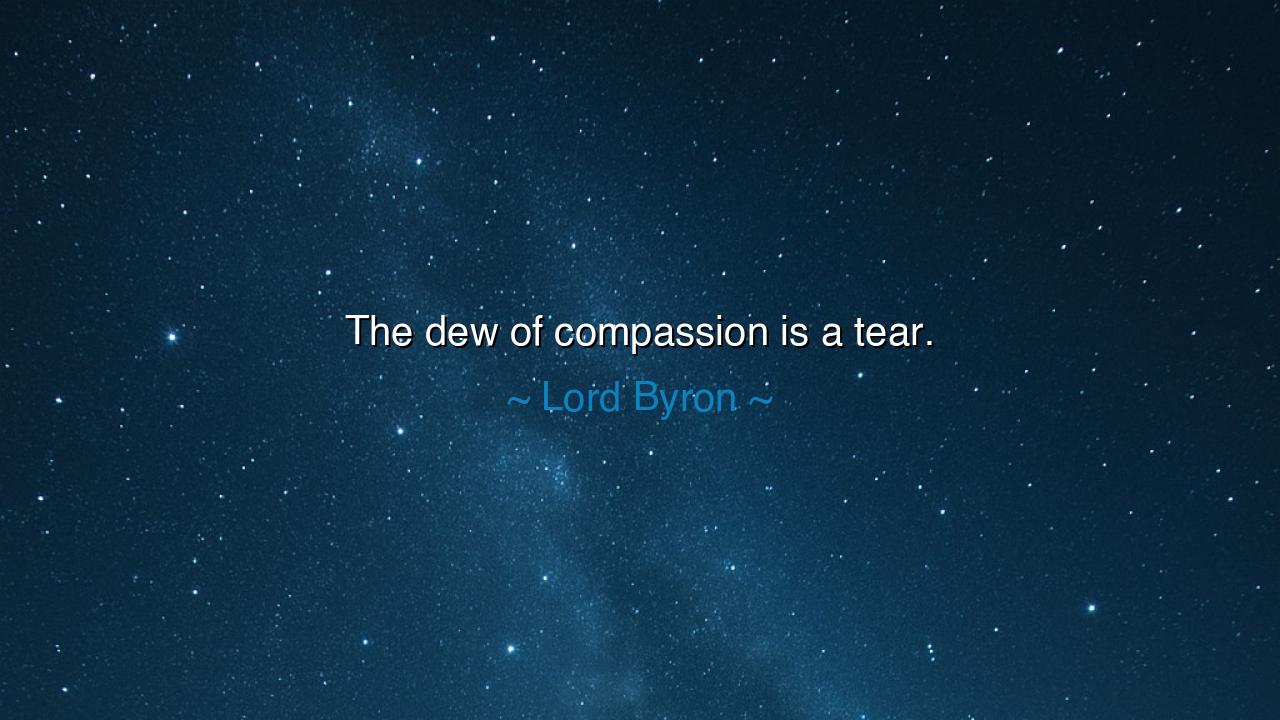
The dew of compassion is a tear.






Hear the tender and piercing words of Lord Byron, the fiery poet of passion and sorrow: “The dew of compassion is a tear.” In this brief and luminous image, Byron reveals that the purest sign of empathy is not found in grand speeches nor lofty declarations, but in the quiet and unbidden welling of the eye. Just as dew gathers silently on the grass at dawn, so too does the tear form gently when the heart softens in mercy and feels another’s pain as its own.
The tear is among the oldest languages of humanity. It needs no translation, no explanation; it is understood alike by king and beggar, by child and elder. When Byron speaks of it as the dew of compassion, he suggests that it is not a weakness, but a holy adornment—like the morning’s jewels upon the earth, small drops that reveal the presence of something larger: the unseen cloud of empathy, the hidden storm of feeling. Thus, the tear is the natural flowering of a soul that has not been hardened.
The ancients recognized this truth. In the stories of Homer, when Achilles mourned the death of Patroclus, he wept not as a coward but as a man fully alive to love and loss. Alexander the Great, conqueror of worlds, is said to have shed tears upon seeing that no more lands remained for him to take. These were not signs of frailty, but of humanity. For when power is tempered by compassion, it is the tear that proves the heart has not turned to stone.
History too bears witness. Consider Abraham Lincoln, who during the horrors of the American Civil War was reported to weep quietly when reading the lists of the fallen. Though president and commander, he allowed himself to feel the anguish of his people. His tears did not undo the war, but they revealed the dew of compassion that kept him human amid the machinery of death. Byron’s words find perfect reflection here: the tear is the smallest, yet truest, offering one can give to another’s suffering.
And yet, O listener, do not mistake Byron’s vision as mere sentiment. The tear is not an end in itself, but a beginning. It is the seed of action, the first stirring of the soul that may move one to kindness, to comfort, to justice. Without the tear, compassion may remain dry and lifeless, no more than a thought. But when the eye moistens, the heart is awakened, and the will is stirred to heal what is broken.
The lesson is this: do not scorn your tears, nor hide them as if they were shameful. They are not weakness, but testimony that your spirit is alive, tender, and strong enough to feel. And more than this—when you see another weep, honor that moment, for it is the revelation of their compassion, the dew upon the grass of their soul. In those drops lies the bond of shared humanity.
Therefore, O traveler of life, let your eyes be unafraid of tears. Let them fall when you behold suffering, when you witness injustice, when you encounter beauty too great for words. For in those small drops shines the dew of compassion, and through them, you become a vessel of love in a world that so often grows cold.
So remember Byron’s wisdom: a tear is not merely salt and water—it is the outward sign of inward mercy, the dew that proves the heart has not hardened. Treasure it, let it guide you, and may your compassion water the dry places of the world until they blossom again with life.






AAdministratorAdministrator
Welcome, honored guests. Please leave a comment, we will respond soon